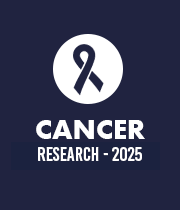Biology of Cancer
Cancer is a genetic disorder in which the information in cellular DNA is distorted, resulting in aberrant gene expression patterns. As a result, normal genes that control normal cellular processes like growth, survival, and invasion/motility are amplified, whereas genes that inhibit these effects are suppressed. Although non-mutational (epigenetic) alterations produced by mechanisms such as DNA methylation are becoming recognized as crucial to the process, the accumulation of mutations is the major mechanism of alteration. The so-called hallmarks and enabling characteristics of cancer are basic alterations in biological processes within cancer cells caused by abnormal gene expression. Eight distinct hallmarks and two additional so-called enabling traits can be used to understand cancer's biological behavior. In cancer medicine, a better understanding of the biological basis of these processes has transformed diagnosis, treatment and prognosis.
- Oncogenes
- Tumor Suppressor Genes
- Apoptotic pathways
- Cellular immortalization
- Mutagens
- Invasion and metastasis
- Immune checkpoints

Rajvir Dahiya
University of California San Francisco, United States
Atif A Ahmed
Seattle Children’s Hospital, United States
Michael Thompson
University of Toronto, Canada
Mariola Wioletta Borowska
Maria Sklodowska-Curie National Research Institute of Oncology, Poland
Andrea González Báez
Autonomous University of Nuevo Leon, Mexico
Qian Zhang
The Affiliated Changzhou Second People’s Hospital of Nanjing Medical University, China


Title : A novel mRNA genomic technology for precision medicine, early cancer diagnosis, prognosis, treatment follow-up and cancer gene therapy
Rajvir Dahiya, University of California San Francisco, United States
Title : The future of pharmacogenetic polymorphism, pharmacogenomics and pharmamicrobiome in cancer treatment
Bene Ekine-Afolabi, University of East London, United Kingdom
Title : Biosensor-based detection of cancer biomarkers
Michael Thompson, University of Toronto, Canada
Title : Hospital care for cancer patients - safety, quality of care, education and respect for patient’s rights
Mariola Wioletta Borowska, Maria Sklodowska-Curie National Research Institute of Oncology, Poland
Title : Importin7 induces M2 macrophage and promotes the progress of colorectal cancer by regulating the nucleus translocation of GRP78
Changjiang Yang, Peking University People's Hospital, China
Title : Cancer-associated fibroblasts derived soluble CADM1 predicts response to neoadjuvant chemoimmunotherapy in lung cancer
Jian Li, Shanghai Jiaotong University, China